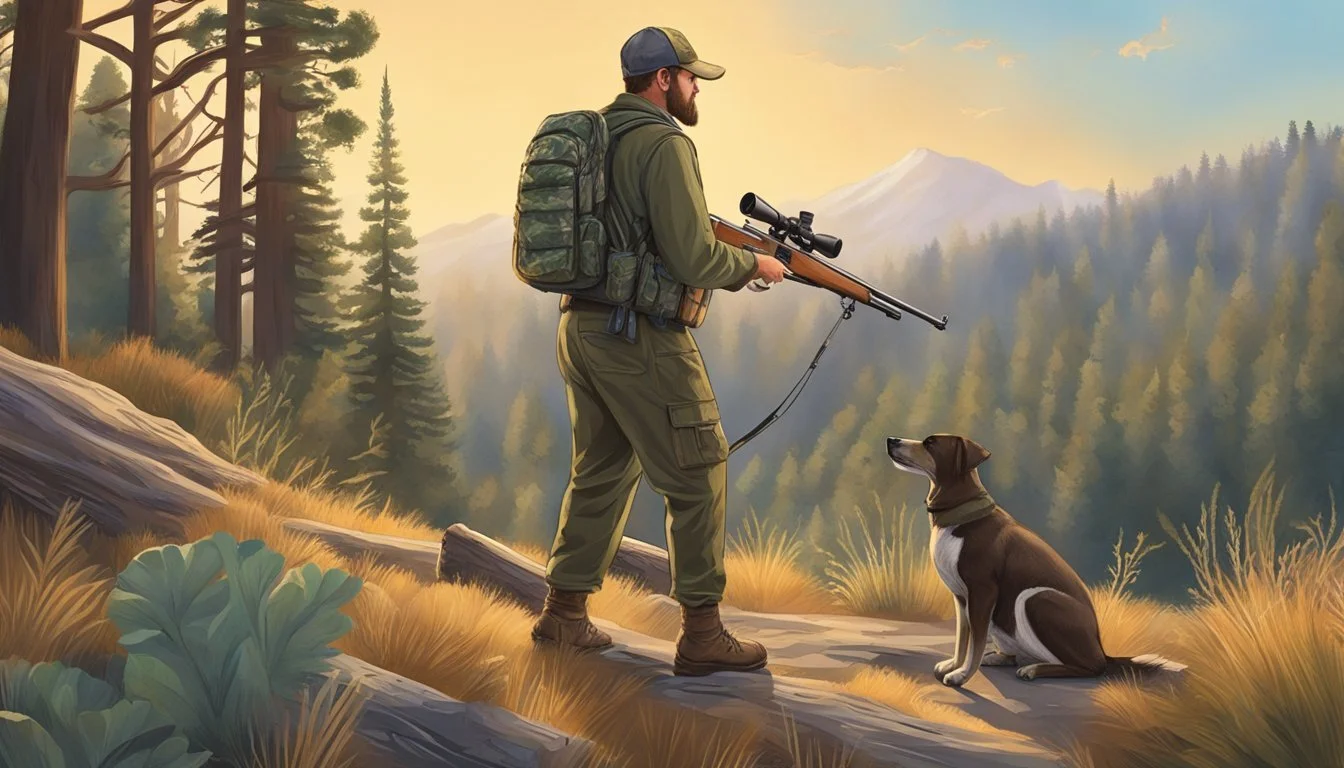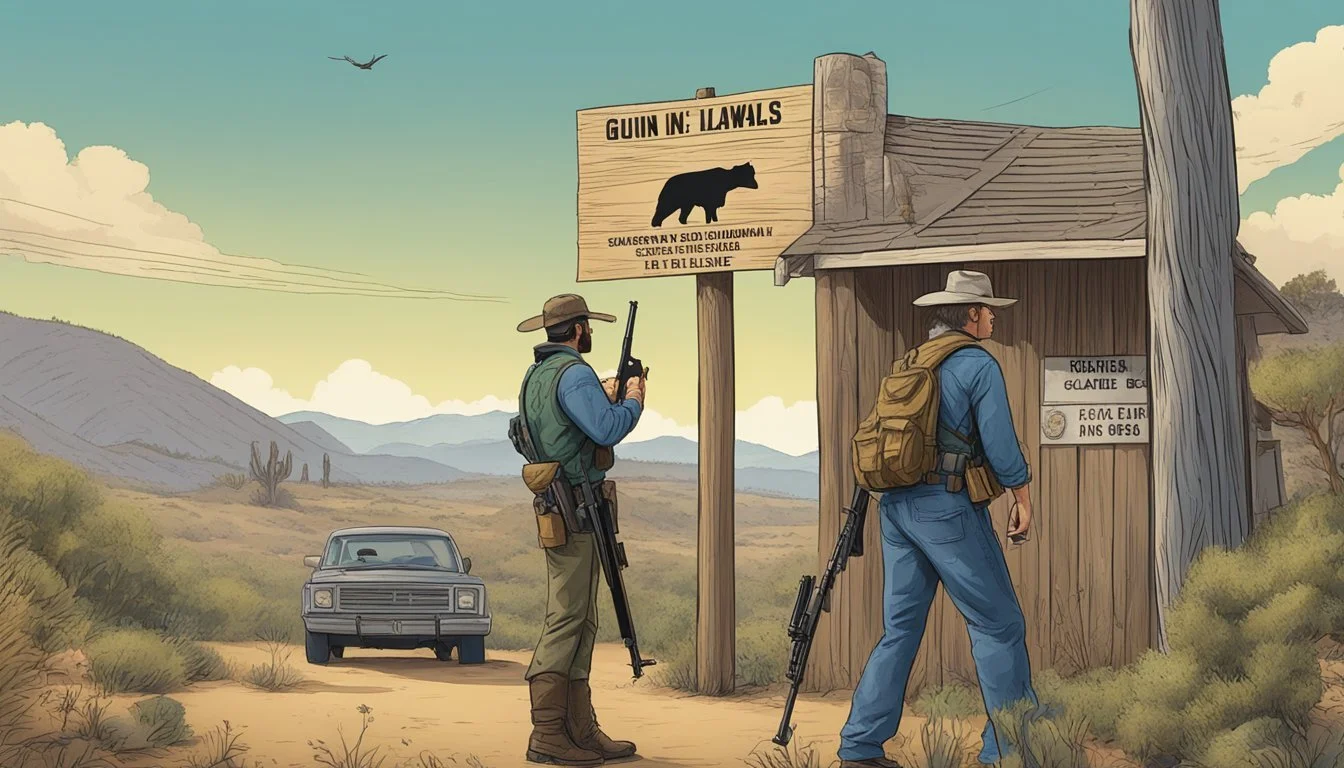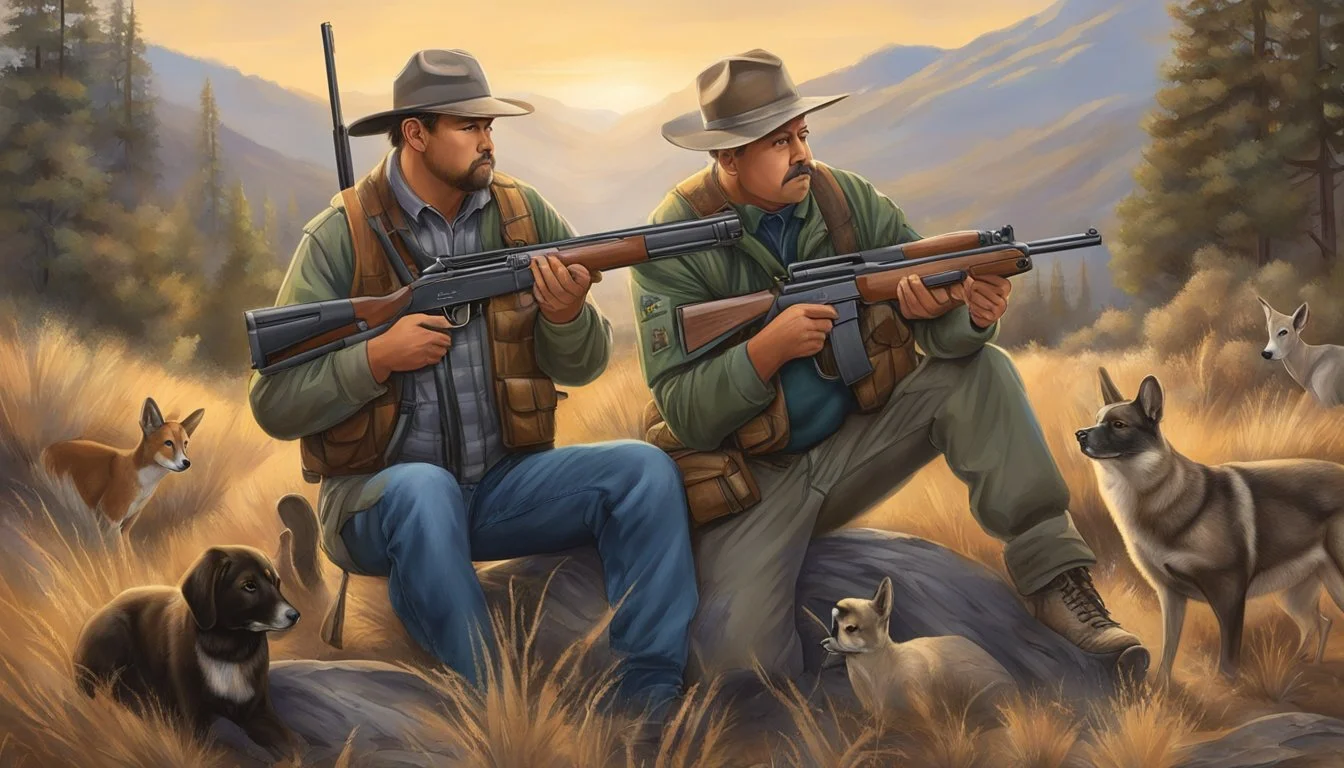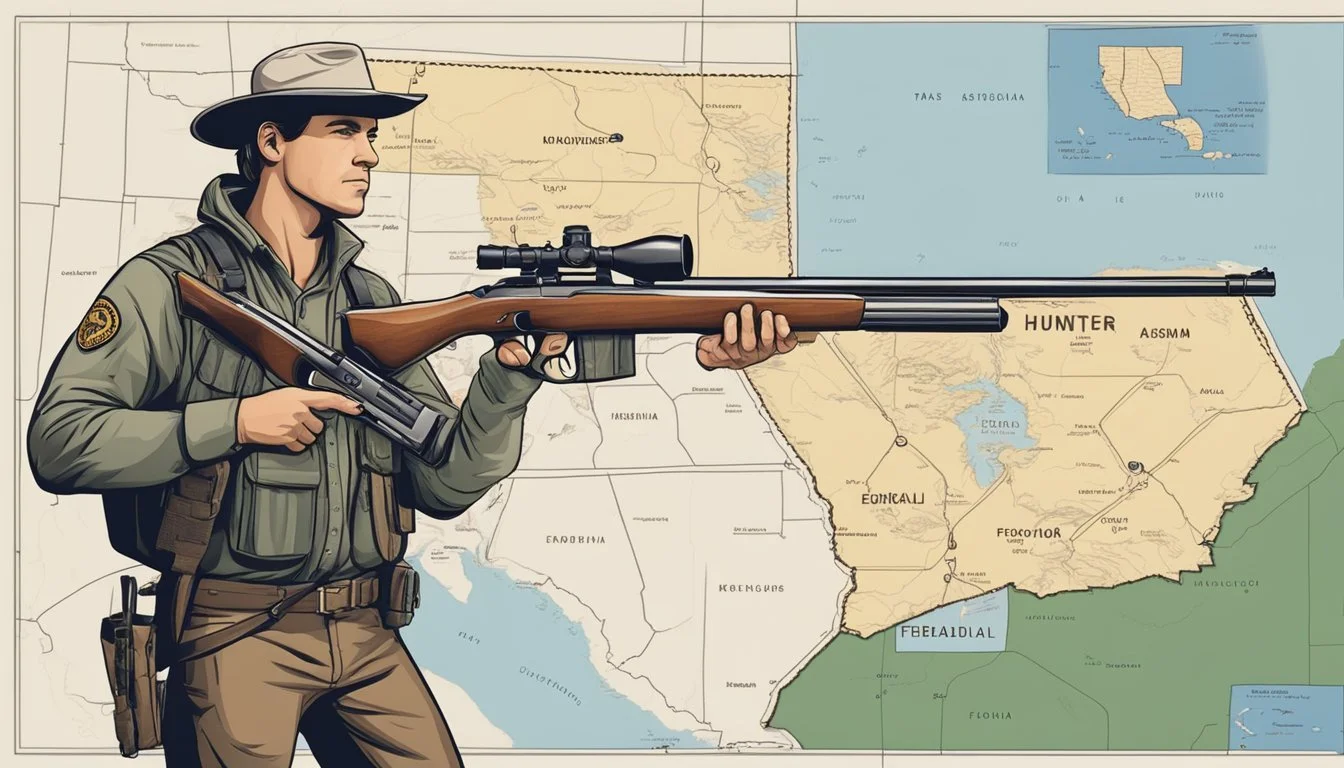Gun Laws in California for Hunters
Regulations and Compliance Guide
California is known for having some of the most stringent gun laws in the United States. These regulations extend to hunters within the state, who are required to navigate a complex framework of rules to engage in their outdoor pursuits legally. Aspiring and experienced hunters alike must familiarize themselves with the specifics of California's firearms regulations to ensure compliance. The laws encompass a range of elements including the types of firearms permissible for hunting, the process of acquisition, and the mandated handling of firearms in hunting scenarios.
For hunters in California, adherence to gun laws begins with the legal purchase and possession of firearms. Individuals are required to be of a certain age to buy a handgun or long guns, such as shotguns or rifles, and undergo a background check during the purchase. This process involves a Dealer Record of Sale (DROS) which applies to transactions through licensed dealers as well as private purchases and gun show acquisitions. Certain individuals may be prohibited from purchasing or possessing firearms based on criteria established by state law.
Once a hunter has legally obtained a firearm, there are additional rules regarding its use and transportation in hunting environments. For instance, it is unlawful for hunters to load their firearms until they are in an area where hunting is permitted. Compliance with hunting hours, as set by the California Department of Fish and Wildlife, is also enforced to promote safety and conservation efforts. These provisions are part of a broader system of regulations intended to prevent unlawful hunting practices and to protect the natural environment and the safety of individuals.
Overview of California Gun Laws
California has stringent regulations concerning firearms, which hunters must navigate carefully. Under California law, individuals are required to be at least 21 years old to purchase a handgun and 18 years for a shotgun or rifle. All firearm purchases, including private and gun show transactions, necessitate a Dealer Record of Sale (DROS) background check through licensed dealers.
Possession Laws:
A permit is not required for the possession of a rifle or shotgun.
It is unlawful for individuals to possess an "assault weapon" or .50 caliber BMG rifles unless they are properly registered.
Firearms Restrictions:
Prohibitions: Certain persons, including felons and those with specific mental health conditions, are prohibited from firearm possession.
Magazine Capacity: High-capacity magazines holding more than 10 rounds are not permitted.
Legislative Measures:
Legislation passed in mid-2022 introduced further restrictions:
AB 2571: Bans marketing firearm-related products to minors.
AB 1621: Imposes regulations on "ghost guns" (firearms without serial numbers).
Carrying Firearms:
Open carry is generally prohibited.
Concealed carry requires a license, subject to county discretion and applicant qualification.
Hunters must also be conscious of their rights under the Second Amendment, which allows law-abiding citizens to possess firearms. California's approach seeks to balance these constitutional rights with public safety considerations. As the laws are numerous and can change, hunters are encouraged to keep abreast of the current legislation to ensure compliance.
Licensing and Background Checks
California hunters must navigate a stringent set of rules for firearm licensing and background checks. The state's framework is designed to ensure only eligible individuals can possess firearms, thereby emphasizing safety and compliance.
Applying for a Firearms License
To apply for a firearms license in California, an individual must meet specific age and legal status requirements. Applicants for a long gun must be at least 18 years old, while those aiming to obtain a handgun must be 21 years of age or older. Moreover, they must be either a U.S. citizen or a legal resident. Applications are processed through the California Department of Justice.
Mandatory Background Checks
The state mandates thorough background checks for all prospective firearm owners, which are conducted by the California Department of Justice. The process examines the individual's criminal history, mental health status, and any history of restraining orders that may disqualify them from firearm ownership. This system is pivotal in preventing ineligible persons from obtaining firearms.
10-Day Waiting Period
After the background check, a 10-day waiting period is imposed before the actual transfer of the firearm can occur. This period serves as a cooling-off time and allows for the full completion and review of all necessary eligibility checks, ensuring compliance with California's gun laws. During this window, the Department of Justice finalizes the documentation and ensures the applicant's eligibility before the license issuance.
Legal Requirements for Hunters
In California, hunters are required to adhere to strict regulations that govern the use of firearms, the timing of hunting seasons, and the acquisition of the appropriate hunting credentials. These mandates ensure the safety and preservation of wildlife populations.
Hunting License
To legally hunt in California, an individual must possess a valid hunting license issued by the California Department of Fish and Wildlife (CDFW). This license is mandatory for anyone seeking to hunt within state boundaries. Residents and non-residents must pass the Hunter Safety Course before obtaining a license. Additionally, specialty licenses, such as those for juniors or disabled hunters, might be available.
Possession Limit
The state enforces possession limits which stipulate the maximum number of game animals a hunter can legally hold at any given time. These limits are designed to prevent overhunting and ensure sustainable wildlife populations. Limits vary by species, and it is crucial for hunters to familiarize themselves with the specifics for the game they intend to hunt.
Hunting Season Information
Each game species in California has a designated hunting season which is set and regulated by the CDFW. Hunting outside of these specific time frames is illegal and can result in penalties. Seasons are established to manage wildlife resources effectively and can be found detailed in the annually updated California Hunting Regulations booklet. Hunters should consult this resource to stay informed on season dates and any changes to regulations that may affect their plans to hunt with a firearm.
Gun Possession and Ownership
In California, strict regulations govern who may possess and own firearms. Key points such as age requirements, restrictions on prohibited persons, and mandatory firearm registration procedures establish the framework for lawful gun possession and ownership by hunters.
Age and Eligibility
Individuals must be 21 years of age or older to legally purchase a firearm in California. To be eligible, one must also pass a Firearm Safety Certificate test, demonstrating knowledge of firearm safety and the law.
Prohibited Persons
Certain individuals are barred from firearm possession and ownership. These include anyone with a felony conviction, individuals with certain misdemeanor convictions, individuals subject to a restraining order, and those adjudged mentally incompetent. A full list of prohibitions is maintained by the California Department of Justice.
Felony Conviction: Permanent ban on possession.
Misdemeanor Conviction: May result in a temporary or permanent ban depending on the offense.
Restraining Order: Temporary ban while the order is in effect.
Mental Health: Varies based on court findings and holds.
Firearm Registration
Firearm registration is a mandatory process for gun ownership. Newly acquired firearms must be registered with the California Department of Justice within 10 days of purchase. Registration details must include personal information, a description of the firearm, and the serial number. Transfer of gun ownership, whether by sale, lease, or inheritance, also requires notification of the Department of Justice.
Transporting and Carrying Firearms
In California, hunters must adhere to strict regulations for transporting firearms in vehicles and understand the laws regarding open and concealed carry. These measures are crucial for ensuring safety and compliance with state law.
Transporting Firearms in a Vehicle
When it comes to transporting firearms in a motor vehicle, a hunter has to ensure that all firearms are unloaded and placed in a locked container. The container should then be stored in an area of the vehicle that is inaccessible while driving—preferably the trunk. Rigorous adherence to these steps is essential, particularly because transporting a loaded firearm is a violation of California Penal Code. However, there are exceptions in certain scenarios, such as when an individual possesses a valid concealed carry permit.
Optimal practices for vehicle transport include:
Unloading the firearm completely
Ensuring no ammunition is within the firearm
Locking the firearm in a hard-sided, secure container
Regulations make a clear distinction that the locked container cannot be the utility or glove compartment. Hunters are advised to go directly from their starting point to their destination without unnecessary stops to prevent any complications with law enforcement, especially in public places or on public streets.
Open and Concealed Carry Regulations
When it comes to carrying firearms, California's laws prohibit the open carry of handguns and long guns in public places, with some exceptions for hunting areas under specific regulations. It is generally illegal to carry a concealed firearm without a permit in California, which includes both loaded and unloaded firearms. It is important for hunters to note that even with a concealed carry permit, there are restrictions that apply to certain public spaces and buildings.
Carry regulations in public can vary and often include:
Openly Carrying: Prohibited in public places, except in some hunting areas during hunting season, under particular circumstances.
Concealed Carry: Requires a permit and is subject to strict qualifications and local law enforcement discretion.
Hunters should always consult current California Penal Code and stay updated with any changes in legislation concerning firearm transportation and carry laws to ensure they remain compliant with state regulations.
Assault Weapons and Ammunition
In California, hunters must navigate stringent regulations surrounding assault weapons and ammunition. Understanding these rules ensures compliance with state laws.
Definition of Assault Weapons
California law defines an assault weapon by type, features, and model. The state specifically bans firearms classified as assault weapons, which can include semiautomatic centerfire rifles that have the capacity to accept detachable magazines and certain specified features. These features may include, but are not limited to, pistol grips, thumbhole stocks, folding or telescoping stocks, grenade launchers, or flash suppressors.
Magazine Capacity Limits
Magazine capacity is regulated in California. The sale of magazines that hold more than ten rounds is prohibited under Penal Code section 32310. Hunters are restricted to using magazines that meet this capacity limit to stay within legal boundaries.
Ammunition Regulations
The sale and use of ammunition is closely controlled. Buyers of ammunition must undergo a background check and can only purchase through licensed vendors. Moreover, specific types of ammunition, such as armor-piercing cartridges, are banned in California. Centerfire cartridges, often used in hunting, are subject to these regulations and must be purchased in compliance with state laws.
Firearm Safety and Storage
In California, hunters must comply with stringent firearm safety and storage regulations to prevent unauthorized access and enhance safety. These laws are critical in maintaining a secure environment both within the hunter's residence and in the community at large.
Safe Storage Laws
California mandates that firearms be stored securely to prevent access by unauthorized users, particularly minors. Firearms should be kept in a locked container or secured with a state-approved safety device. It is a legal requirement that a firearm is not loaded when stored. In the event of non-compliance, the firearm owner may face liability, including both criminal and civil consequences.
Residence Storage Requirements:
Locked container or state-approved locking device required
Separate storage of firearms and ammunition encouraged
Penalties for Unsafe Storage:
Possible misdemeanor or felony charges
Penalties may include fines and imprisonment
Firearm Safety Certificate
Before purchasing a firearm, hunters in California are required to obtain a Firearm Safety Certificate (FSC). This certificate demonstrates that the individual has a basic understanding of firearm safety. To acquire an FSC, one must pass a written test covering a variety of topics, including the safe handling and storage of firearms.
Certificate Validity:
The FSC is valid for five years.
Test Components:
Written examination on firearm safety and laws
Secure storage practices
Safe handling of a loaded firearm within a residence
By adhering to these regulations, hunters can ensure they responsibly use and store their firearms, thereby protecting themselves and those around them.
Restrictions on Sale and Distribution
California imposes strict regulations on the sale and distribution of firearms which hunters must navigate carefully to remain compliant with state laws.
Prohibited Sales
In California, it is illegal to sell firearms to anyone under the age of 21, with few exceptions. Sales of assault weapons and "ghost guns"—firearms without serial numbers—are also banned. The state additionally forbids the distribution of ghost gun component parts that could be assembled into a firearm.
Transfers and Private Sales
All transfers, including private sales, gifts, or loans of firearms, must go through a licensed firearms dealer. The Dealer's Record of Sale (DROS) process is a mandatory aspect of all firearm transactions. This ensures that a background check is completed before the transfer and that the sale is properly recorded.
Import and Manufacture Regulations
The manufacture and import of assault weapons and ghost guns in California are prohibited. Manufacturers and importers must adhere to state serialization requirements and cannot legally introduce non-serialized firearms or incomplete receiver parts into the commerce of the state. Any firearms intended for sale or distribution in California must have a unique serial number and be registered with the California Department of Justice.
Special Categories of Firearms
California gun laws address various unique firearms, including "ghost guns" and antique collectibles, which fall under specific regulations due to their distinct characteristics and the potential difficulty in tracing or categorizing them.
Ghost Guns
In California, "ghost guns" refer to firearms that are manufactured by an individual, not traditionally serialized, and lack commercial manufacturing markings that make them traceable. This category has garnered particular attention due to the challenges it poses for law enforcement. Legislation mandates individuals who manufacture or assemble these firearms to apply for and receive a unique serial number from the California Department of Justice before making or assembling the gun, including the frame or receiver, the main parts of the firearm that are regulated by law.
Antique and Collectible Firearms
Antique and collectible firearms are another key area of California gun law. These firearms often possess historic value and are generally defined by their age, typically being manufactured before 1899. They are not subject to the same regulations as modern firearms due to their collectible status and are also not required to be transferred through a licensed firearms dealer. However, collectors must be aware that if an antique firearm is modified or used in a way that it becomes operable, it may then be subject to the same laws and regulations as contemporary firearms.
Legal Ramifications and Enforcement
In California, the legal ramifications for violations of gun laws are strict and clearly defined. Enforcement is rigorously carried out by law enforcement officers who ensure compliance and penalize offenses which range from misdemeanors to felonies.
Crimes Involving Firearms
Violations of firearm regulations can have severe consequences in California. They are enumerated based on the nature and severity of the offense, including:
Felony Offenses: These include violent crimes with the use of a firearm, such as murder, rape, robbery, and kidnapping. Convictions can lead to substantial prison time.
Misdemeanor Offenses: Lesser offenses such as unlawful possession or carrying a loaded firearm in a public place can result in fines and jail time.
The possession of a firearm by individuals convicted of a felony, or by those who are prohibited from owning a firearm, is itself a felony in California.
Law Enforcement's Role
Law enforcement officers in California play a crucial role in the enforcement of gun laws:
Proactive Prevention: Officers are tasked with preventing firearm-related crimes through community outreach and education.
Investigation and Prosecution: Law enforcement is responsible for investigating firearm-related crimes and working with the legal system to prosecute offenders.
In compliance with these laws, law enforcement officers are authorized to seize firearms used in the commission of crimes or possessed illegally. They also enforce background checks and mandatory waiting periods stipulated by California law.
Federal Laws and Interstate Issues
California gun laws for hunters frequently intersect with federal regulations, creating a complex legal landscape. Hunters must navigate these laws with precision to ensure compliance on both state and federal levels.
Interaction with Federal Laws
Federal law establishes the groundwork for gun ownership, such as the Gun Control Act of 1968 and the Brady Handgun Violence Prevention Act. These acts mandate background checks and define prohibited persons from possessing firearms. In addition, The Bureau of Alcohol, Tobacco, Firearms and Explosives (ATF) regulates interstate commerce of firearms.
California's Legislation often enhances these federal laws with more stringent restrictions. For example, California's assault weapons ban, although recently challenged in court, historically presented a stricter stance compared to federal guidelines. The state's regulations on magazine capacity and the types of allowable firearms go beyond what federal law prescribes.
Interstate Transport and Reciprocity
When transporting firearms across state lines, hunters must abide by the federal Firearm Owners Protection Act (FOPA), which allows for the transport of unloaded firearms in a locked container, separate from ammunition.
Reciprocity refers to whether another state recognizes California's concealed carry permits, and California does not have reciprocity with any other states. Hunters must therefore be aware that their California-issued licenses and permits will not grant them the right to carry concealed weapons in other states.
Armed Forces Members stationed in California must comply with state laws, despite federal military regulations that might differ. It is crucial for service members to understand the specific legal requirements of California when they are off federal property.
For hunters, navigating federal and California's state laws is vital for lawful hunting and firearm possession, both within and across state lines.
Rights and Advocacy
In California, the ongoing discourse on gun laws balances the rights of gun owners with considerations for public safety. This section delves into both the rights upheld for those owning firearms and the advocacy groups active within the legislative sphere in Sacramento.
Gun Owner Rights
Gun ownership in California is tied to the state's complex regulatory scheme, which Gov. Gavin Newsom and the state legislature often review with public safety in mind. Gun owners are required to navigate a series of laws that delineate who may possess firearms, under what conditions, and the types of firearms permissible. Under these laws, individuals must be 21 years of age to purchase a handgun and at least 18 to buy a shotgun or rifle. Additionally, they must pass a background check through the Dealer Record of Sale (DROS) process, even in private sales or purchases at gun shows. These regulations reflect California's endeavor to respect an individual’s constitutional right to bear arms while prioritizing the welfare of its communities.
Advocacy Groups and Legislation
Advocacy groups play a pivotal role in shaping California's gun laws. The California Rifle & Pistol Association (CRPA) focuses on training, promoting responsible firearm use, and holding sanctioned shooting competitions. Simultaneously, it upholds the rights of Californians to own guns for sport, hunting, or self-defense. Another group, the California Gun Rights Foundation, has been actively involved for over a decade in litigating to restore and protect Second Amendment rights in the state.
Advocacy Group Key Activities Aim CRPA Training, Competitions, Legal Advocacy Defend Second Amendment rights, Promote Safety California Gun Rights Foundation Litigation, Policy Analysis Restore Firearms Rights, Ensure Regulatory Fairness
Both groups have been known to challenge legislation they perceive as infringing on gun rights, demonstrating the dynamism of advocacy in Sacramento. Their efforts often intersect with the directives of Gov. Newsom and the attorney general's defense of California's firearms laws in the courts. The interplay between these entities exemplifies the robust dialogue and action surrounding firearms legislation in California.









